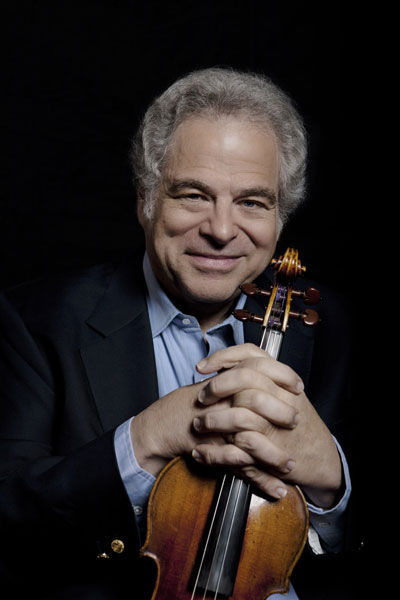By Nathan Phan, Special Writer
It’s important you really love what you do, and if you are lucky enough to find something that you are good at and that you love, it can be the beginning, said world-renowned violinist Itzhak Perlman.
The winner of 16 Grammy awards spoke alongside his wife, Toby Perlman, Tuesday evening at Princeton University in Richardson Auditorium.
“I’m trying to encourage the students to listen more to what’s going on,” said Mr. Perlman, 70. “When you do that, you don’t want to just concentrate on how do I do this, how do I do that — that’s just one part. The other part is just what does this music means to me, and how do I express that?”
The Perlmans were the first guest speakers of the Class of 2016’s Last Lecture Series, designed to help inspire Princeton seniors and give them the opportunity to attend special talks before they graduate. Throughout their lecture, Mr. and Ms. Perlman spoke about their lives, how their aspirations as children came about as they became musicians. At the end of the lecture, they were both inducted into the Class of 2016, one of the highest honors students can bestow.
“I had a vision of what I wanted the world to be like,” said Ms. Perlman. “And I did dream about it as a kid at Juilliard, when I was so miserable. I was always so unhappy at school, and I felt so stupid and incompetent. And I had an idea, [that] one day maybe I’ll change [it].”
Founding The Perlman Music Program (PMP) in 1994, a program that gives young string players the opportunity to be trained by professional faculty, Ms. Perlman explained how important it is to make music accessible to young children. After encouraging her husband to be an instructor for the program, Ms. Perlman witnessed not only a growth of the program and its students, but in her husband’s musical abilities as well.
“I sincerely from the bottom of my heart believed that it was this commitment that you [Itzhak] made to teaching that put your playing on the level it is today,” Ms. Perlman said.
Ms. Perlman emphasized the importance of introducing music to children at an early age, describing the difficulty for students to grow musically once they are out of school. Both Mr. and Ms. Perlman expressed a strong belief in needing to improve music education in schools, especially in finding teachers who are willing to teach.
“The quality of the music education has got to be better,” said Mr. Perlman. “You got to have teachers who are really so dedicated and feel it [passion], in order for them to give it to the students. I find that teachers in general are the most underestimated [underappreciated] members of society.”
Having both been mentored under Dorothy DeLay, the famous American violin instructor at the Juilliard School, Mr. and Ms. Perlman described how Ms. DeLay played an important role in shaping them as musicians and eventually instructors. Mr. Perlman emphasized how differently Ms. DeLay taught compared to his prior instructors, how she encouraged him to engage with the music rather than just follow her orders.
“I really did not like that style [she taught] at all, and funnily enough, that’s the way I teach,” said Mr. Perlman. “I mean all of that because it involves the student in the process and I think that’s so very, very important rather than following orders. You [the musician] have to have something of your own here [in the teaching process].”
Having raised five children throughout their careers, Mr. and Ms. Perlman described how essential it was that they kept each other balanced in their careers and marriage. Mr. Perlman jokingly expressed how Ms. Perlman still finds ways to help him improve, pointing out his mistakes several weeks after his concerts.
“In your future, your spouse is the most important part of your life,” Mr. Perlman said. “String players, or pianists or any instrument [player] you know, [when] they finish school, you’re on your own, that’s it. With Toby, we have a relationship, in which if she doesn’t like something, she does not feel she cannot say anything to me.”
Even after years of working as musicians and instructors, music continues to be a big part of their family. As grandparents, they both see their children incorporating music into their own children’s lives.
“The music gives us permission to dream, and out of our dreams, sometimes something important happens,” Ms. Perlman said. “It gives us permission to feel, to be human – it’s what separates us [from other species]. Great music moves us to another sphere of consciousness.”

